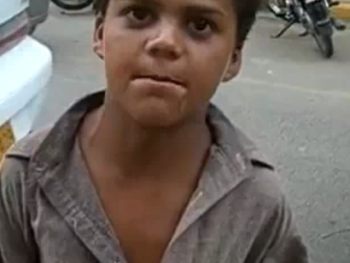Cultural Globalization and Pakistani Rap Beggars, with Cord Jefferson

About two years ago, on a sluggish L into Manhattan, the train stopped suddenly somewhere under the East River, flinging forward anyone who hadn’t been gripping seat or strap. I watched as a white gentleman-neo-nerdy and a bit old for his skinny jeans-reached much too late for the pole to his left. He stumbled hard into a black guy about 15 years his junior and one foot taller, causing the black guy to drop his soda. Immediately, everyone fell silent and stared, as if the spilled Dr. Pepper were a Baselitz he’d been delivering as a gift.
The white guy tried to apologize, but the black guy wasn’t having any of it. “You stupid motherfucker,” he shouted, lifting and spreading his shoulders like a cobra does its hood. “Why don’t you watch what the fuck you’re doing?” “I’m so sorry, real- The black guy cut him off: “Shut the fuck up!” The older man did what he was told. He turned away, defeated, brown sugar-water staining his Chucks, and stared out the window, through which he could now see the bright, mildewy 1st Avenue stop.
I’m sure many New Yorkers have witnessed similar altercations (these things happen when you put eight million people in a city that should fit half that), and when they do, I’m sure most think, “I am so glad that’s not me being screamed at by the huge black guy.” Instead, that day, I couldn’t stop thinking about how similar I looked to the angry black kid: tall, slender, black fitted baseball hat, black jeans, black hoodie, black North Face jacket, black face.
It’s a tendency I’ve never been able to shake. When a young black man acts crazily in my presence, I can’t help but feel that, secretly, everyone is not only judging him, but also me, for looking like him. I imagine a field of grenades, a couple of which are painted red. When one of the red ones explodes, a smart person moves away from the other red one. I now look at black people screaming at white people-or Asian people or Puerto Ricans or at each other-and think, “You’re making it worse for the rest of us. You’re making it worst for the rest of us. You’re making it worse for the rest of us.”
It’s mainly this reason that I’ve gradually begun to hate mainstream hip hop. I hate the idea that someone somewhere might go from watching MTV, which has never batted an eyelash about the societal consequences of videos in which black men literally throw money at women in bikinis, to staring at me and saying, “I bet he loves getting buzzed on cough syrup and would need to be subtitled in his documentary, even though he’s speaking English.” I’m ashamed of the glorified drug dealing. I’m ashamed of the glorified violence. I can’t stand the idea of becoming a ridiculous, thuggish punchline by proxy.
So this phenomenon emerging amongst young Pakistani flower sellers pains me quite deeply. Apparently, it’s now cool for enterprising street children in Karachi to rap this little verse, no doubt learned by rote: “Buy one flower/take a flower/gimme 10 rupees/wassup my nigger/yeah nigger/once you go black you never go back/motherfucker.”
I’m sure the only thing the kids comprehend about what they’re saying is that it causes white Westerners to laugh and give them money (which is to the boys’ credit, because I’m three times their age and still can’t tell you a joke in Urdu). But someone had to export these phrases. Someone knew what they meant. And though a 9-year-old Pakistani boy belting out Toby Keith would be just as strangely humorous to Americans as one spitting a confrontational rap, they’re not singing Toby Keith. They’re shouting “nigger.”
I look at these boys and I think of that day on the train. I envision a man, perhaps the one providing these children with their colorful, cheap wares, teaching them that rap music-something as inextricably linked to urban black masculinity as the dozens-is more of a stand-up routine than an art form (Lonely Island and the Grammy judges seem to agree). What’s worse is, anymore, I’m not sure that they’re all that wrong.
Cord Jefferson is a writer-editor living in Brooklyn. His work has appeared in National Geographic, GOOD, The Root and on MTV.
